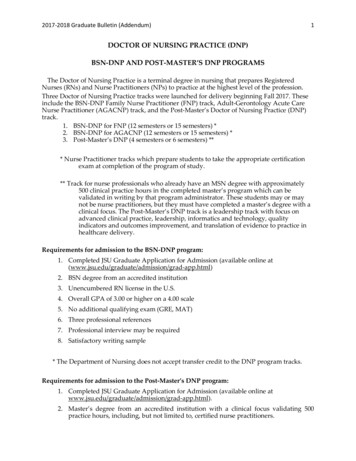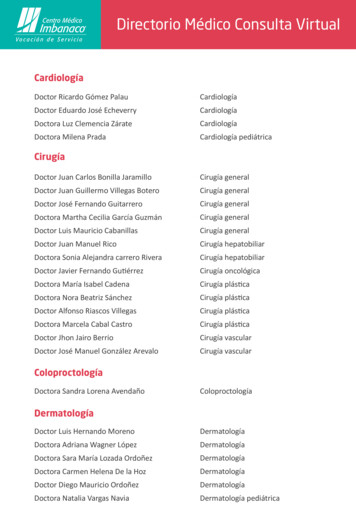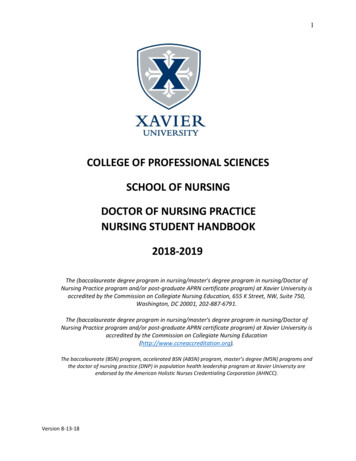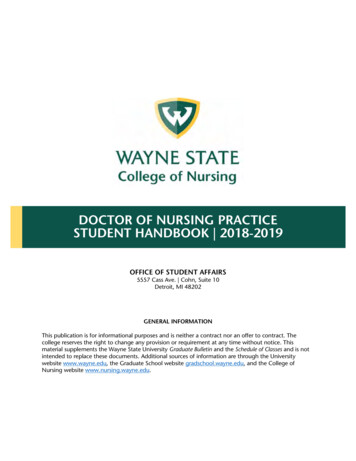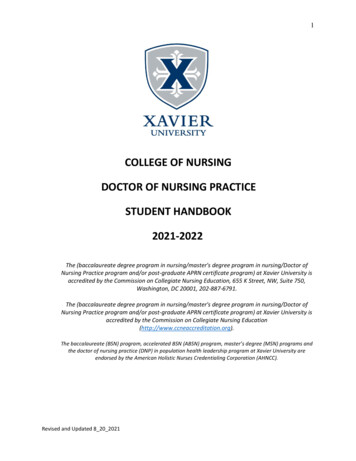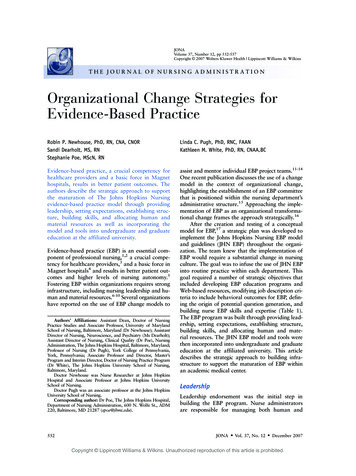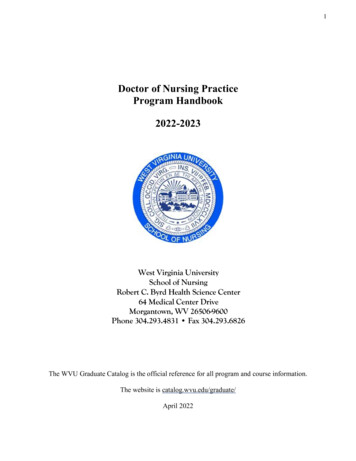
Transcription
1Doctor of Nursing PracticeProgram Handbook2022-2023West Virginia UniversitySchool of NursingRobert C. Byrd Health Science Center64 Medical Center DriveMorgantown, WV 26506-9600Phone 304.293.4831 Fax 304.293.6826The WVU Graduate Catalog is the official reference for all program and course information.The website is catalog.wvu.edu/graduate/April 2022
2Table of ContentsWelcome from the Dean . 5Mission . 5Accreditation. 5Doctor of Nursing Practice Program Overview . 6Program Description . 6Core Competencies . 7DNP Program Outcomes . 8DNP Progression Plans . 9DNP Course Descriptions . 10DNP Admissions . 11Admission Policy for the Post-MSN DNP Program . 11Mandatory orientation. 12Progression and Graduation Standards . 12Graduate Programs Progression Policy . 12Grading Scale. 12Writing Expectations . 13Transfer of Course Work . 13Incomplete Grades . 14Leave of Absence and Withdrawal Policies . 14Withdrawal Policy . 14LOA Policy . 14Graduation Requirements . 15Advising and Student Resources . 15Academic Advising . 15Registering for Courses . 16Credit Loads. 16Financial Aid . 16Additional Student Resources . 16Health Sciences Center (HSC) Information Technology Services (ITS). 16WVU ITS . 16HSC Library. 17Computer Labs. 17Graduate Student Policies and Procedures . 17Academic Integrity Statement . 17ANA Position on Incivility, Bullying, and Workplace Violence . 18Responsible Conduct of Research . 19
3Appeals . 19General Information about the Student Appeals Process. 19Appeal of a Final Grade . 19Appeal of an Academic Penalty (Other Than a Final Grade and Not Based on Academic Dishonesty)(includes appeal of admission decisions) . 20Appeal of a Charge and/or Penalty Based on Academic Dishonesty . 20Precheck Documentation Policy . 20WVU School of Nursing Drug and Alcohol Screening Policy. 21Background Checks . 23HIPAA Requirements . 24Student Health Insurance and Responsibility for Medical Expenses . 24Social Media Policy . 24Student Participation in Online Courses . 25Technical Standards . 26Technology Requirements for the DNP Program . 27WVU Login . 27WVU Student Email System . 28Distance Course Delivery . 28SOLE (Study, Observe, Learn, Engage) . 28Panopto Webcast. 28Collaborate . 28Computer Specifications . 29Computer skills . 29General Program Information . 29WVU Student Identification Card . 29Maintenance of Registered Nurse (RN) Licensure and Advanced Practice (AP) RN Certification . 30Tuition, Transportation, and Other Costs . 30Clinical Immersion . 30Calculation of Post BSN Clinical Hours. 31DNP Clinical Log . 31Preceptors . 32Faculty, Student, and Preceptor Roles . 32Faculty Role . 32Preceptor Role. 32Student Role. 33Expectations . 33Affiliation Agreements (Contracts) for Clinical Sites . 33DNP Project and Portfolio . 33Appendix 1: WVU SON Writing Rubric . 35
4Appendix 2: Application for Transfer of Graduate Credit to WVU . 39Appendix 3: Contract to Remove Grade of Incomplete . 40Appendix 4: DNP Graduation Checklist . 41Appendix 5: Responsible Conduct of Research Graduate Student Guide . 42Appendix 6: Immunization Waiver . 43Appendix 7: Consent Form for Alcohol, Drug, and Substance Testing . 44Appendix 8: Statement of Criminal Record. 45Appendix 9: Verification Form: Precepted Post BSN Clinical Hours . 46Appendix 10: DNP Program Handbook Signature Page . 47
5Welcome from the DeanWe are excited to be involved with our colleagues in the Robert C. Byrd Health Sciences Center inimplementing a vision for health care in the 21st century, founded in WVU's history of excellence andservice, with true social responsibility. We continue to be guided by our Vision: “West VirginiaUniversity School of Nursing envisions optimal health, enhanced quality of life, and excellent healthcare for the people of West Virginia and the global community.” Nursing faculty and students arebringing nurses, nursing education and research, and advanced practice health care to serve the public inboth urban and rural areas. The WVU School of Nursing remains committed to providing the highestlevels of undergraduate professional nursing education, while expanding opportunities for graduateeducation. Our MSN program continues to prepare nurse practitioners for WV with faculty who areexperts in using technology with "high touch" skills. We have approved a dual degree option for nurseexecutives to earn dual MSN/MBA degrees. Additionally, we offer two doctoral programs, the Doctor ofNursing Practice (DNP) - the highest level of nursing practice, and the Doctor of Philosophy (PhD) - fornurses desiring a teaching and research career. Our programs are committed to building access withsuccess throughout the state - regional campus support for undergraduates, online MSN and DNPprograms, and a summer option for the PhD. I look forward to "meeting" you all - virtually or in person.MissionThe mission of the West Virginia University (WVU) School of Nursing (SON) is to lead inimproving health in West Virginia and the broader society through excellence in student-centerededucational programs, research and scholarship, the compassionate practice of nursing, and serviceto the public and the profession.AccreditationThe baccalaureate degree program in nursing/master's degree program in nursing/Doctor of NursingPractice program at West Virginia University is accredited by the Commission on Collegiate NursingEducation, 655 K Street, NW, Suite 750, Washington, DC 20001, 202-887-6791.
6Doctor of Nursing Practice Program OverviewProgram DescriptionThe WVU SON Doctor of Nursing Practice (DNP) Program prepares nurses to practice at the highestlevel of professional nursing. Graduates of the DNP program advance the application of nursingknowledge through the translation and implementation of evidence for practice to improve healthoutcomes for diverse populations. This expert level practice builds on past advanced practice education,experience, and certification.The DNP program can be completed in as few as 32 credit hours. Additional clinical and project creditsmay be required to meet program outcomes. The time to completion of the DNP program variesdepending on the length of the DNP project.The student plan of study for the DNP degree requires 1000 post-baccalaureate hours of precepted clinicalexperience. A minimum of 300 precepted clinical hours must be earned at the DNP level. Manytraditional advanced practice Master of Science in Nursing (MSN) programs require 600 hours ofprecepted clinical practice. Previous precepted master’s level clinical hours, which must be verified,evaluated, and approved by the program director and Associate Dean of Academics, may be included inthe required hours to complete the DNP. At least 400 hours must be obtained in this program, thoughmore may be required. For example, if a student shows evidence of 600 hours of precepted clinicalpractice from his/her MSN program, and the hours are approved, that leaves 400 hours to complete (toequal 1000 post-baccalaureate hours). Students in the program are allotted 180 hours for the DNP project,resulting in 220 hours of immersion (clinical practice) remaining to meet the requirements for the degree.The program includes implementation of a DNP Project. According to the American Association ofColleges of Nursing (AACN), doctoral education is distinguished by the completion of a specific projectthat demonstrates synthesis of the student’s work and lays the groundwork for future clinical scholarlywork directed at improving health or organizational outcomes in the area of focus. The DNP curriculumprimarily involves mastery of an advanced specialty within nursing practice and methods of practiceimprovement and change. The DNP Project is used to demonstrate mastery of the DNP curricular content.Guided by faculty and with assistance of a consultant in the area of interest, the DNP Project demonstratesthe student’s ability to identify a practice or system-related problem through clinical immersion, tosynthesize and critically appraise the evidence related to addressing that practice problem, to negotiatewithin the system, to implement evidence-based change within an organization, to implement that change,and to systematically measure the results of the practice or system-related change initiative. The DNPProject documents outcomes of the student’s educational experiences and summarizes the student’sgrowth in knowledge and expertise. The DNP Project experience serves as a foundation for leadership infuture scholarly practice within the clinical setting.Throughout the curriculum, students are guided in the processes of self-development aimed atpursuing excellence in scholarly, clinical, and professional endeavors. Courses are offered via webbased modalities in asynchronous and synchronous formats. The student should communicate withthe course coordinator when determining what courses are offered synchronously orasynchronously. Students should assume that they will be assigned to a regular day and time for thecourse offering unless told otherwise. Class attendance and participation are expectations in theDNP program. It is a strong University and WVU SON recommendation that students employed infull-time work should enroll for no more than six hours of doctoral level course work at any time.The DNP project proposal and presentation takes place on either the Charleston or Morgantowncampus depending on the preference of the faculty of record.
7Core CompetenciesThe following core competencies provide the framework for the DNP curriculum. The keyconcepts of the core competencies are threaded throughout the curriculum.Core CompetencyProfessional Advanced PracticeRole/InterventionsLeadership & Scholarship/Critical Thinking KeyConceptsAdvanced Nursing knowledgeHolistic NursingPopulation HealthEvidence-Based PracticeClinical Decision Making SkillsCompetencyProfessional DevelopmentQuality and Patient SafetyOrganizational & Systems LeadershipAssessing OrganizationsIdentifying Systems’ IssuesFacilitating Changes in Practice DeliveryHealth Care Issues, Ethics, and PolicyMulti-tiered Healthcare EnvironmentExpanding Collaboration Skills/Referral SystemsTeam LeadershipUsing Information Systems andTechnologies to Improve Health OutcomesTelehealthData MiningPractice Outcome PatternsHealthcare Consumer InformationProfessional and Therapeutic CommunicationScientific UnderpinningsAsk Pertinent Questions Related to Practice &Apply Research to PracticeEvaluate LiteratureDesign and Evaluate Methodologies thatImprove Patient CareThe DNP-prepared nurse is prepared to participate in healthcare in numerous roles including: advanced practice nurse nurse entrepreneur nurse administrator health care advocate
8DNP Program OutcomesAt the completion of the DNP program, the graduate will be able to:1. Use disciplined reasoning, science-based theories, and concepts from sciences and humanities to:a. Determine the nature and significance of health and health care delivery phenomena.b. Describe actions and advanced strategies to improve health care delivery, to diversepopulations.c. Develop, deliver and evaluate theory-based health care.d. Analyze nursing history to expand thinking and provide a sense of professional heritageand identity.2. Demonstrate organizational and systems leadership that:a. Emphasizes clinical practice.b. Continually improves health outcomes.c. Ensures patient safety.3. Use analytic methods, evidence, and nursing science to:a. Critically appraise existing literature to identify and evaluate best practices and practiceguidelines.b. Facilitate the evaluation of systems of care in order to improve patient outcomes.c. Serve as a practice specialist/consultant in collaborative knowledge generating research.d. Disseminate results through translational scholarship.4. Demonstrate proficiency and provide leadership for the integration of informationsystems/technology to:a. Support, monitor, and improve patient care, healthcare systems, clinical decision- making,nurse-sensitive outcomes, and academic settings.b. Support quality improvement and patient safety.5. Assume a leadership role in advocacy and health care policy development.6. Establish, participate in, and lead interprofessional collaborations for improving patient,population, and systems outcomes.7. Develop, implement, and evaluate practice and healthcare delivery models for the purpose ofquality improvement and improved patient outcomes considering:a. Safety and quality.b. Epidemiological, bio-statistical, environmental, and other appropriate scientific data.c. Culturally appropriate care.d. Values based professional practice and behaviors.e. Economies of care, business principles and health policy related to individual, aggregate,and population health.8. Ensure accountability for advanced practice based on refined assessment skills, advancedcommunication skills, biophysical, genetic, genomic, psychosocial, sociopolitical, economic,ethical, and cultural principles.9. Practice and provide services for populations within the area of advanced nursing specialization.
9DNP Progression PlansFull-time ProgressionYear 1FallSpringNSG 739 ScientificUnderpinnings for the DNPRole3NSG 754 Transforming Health CareThrough Information Technology3NSG 724 Health ResearchStatistics 1NSG 707 EBP Methods33Total CreditsNSG 831 DNP ProjectImplementation**Year 2Year 3NSG 704 Health Care Leadership61-23SummerYear 2Year 3Year 411-21-2NS 745 Clinical Immersion*1-3Total Credits2-51-2Total CreditsNSG 832 DNP ProjectPresentation**5-7Total Credits6-962NSG 745 Clinical Immersion*1-5Total Credits3-7SpringNSG 739 ScientificUnderpinnings for the DNPRoleNSG 754 Transforming Health CareThrough Information Technology3Total CreditsNSG 707 EBP Methods3333333Total CreditsNSG 710 Issues/Ethics/PolicySummer1-21-31NSG 745 Clinical Immersion*1-35-6NSG 745 Clinical Immersion*1-5Total Credits3-7Total CreditsNSG 702 Population HealthPromotion33NSG 831 DNP ProjectImplementation**Total CreditsNSG 832 DNP ProjectPresentation**Total Credits 32****FallNSG 745 Clinical Immersion*NSG 745 ClinicalImmersion*NSG 831 DNP ProjectImplementation**NSG 745 Clinical Immersion*NSG 831 DNP ProjectImplementation**2Total CreditsNSG 831 DNP ProjectImplementation**1-2Total CreditsNSG 704 Health Care LeadershipNSG 830 DNP ProjectDevelopment**63NSG 745 Clinical Immersion*Total CreditsNSG 724 Health ResearchStatistics 13Total CreditsNSG 710 Issues/Ethics/PolicyPart-time ProgressionYear 1NSG 702 Population HealthPromotion3Total CreditsNSG 830 DNP Project**Development2NSG 745 ClinicalImmersion*1Total CreditsNSG 831 DNP ProjectImplementation**NS 745 Clinical Immersion*5-93Total Credits31-21-32-52*Total Credits 32****Total clinical immersion hrs—at least 5 credits. A total of 1,000 hours post-baccalaureate supervised clinical experience is required prior to graduation (thisincludes clinical hours accrued during the MSN program). WVU SON requires at least 400 hours of immersion to be completed in the DNP program (180 ofthose hours are credited for the DNP project).**Total DNP project hrs—at least 6 credits. NSG 830, 831, and 832 count toward project hours; NSG 831 is the implementation course and the number ofcredits (minimum, 2) vary depending on the depth, breadth, and timeline of a student’s project.***Individual progression plans to be developed based on previous course work. Total credit hours will vary based on the verification and approval of coursework and/or post-baccalaureate precepted clinical hours gained prior to admission to the program.
10DNP Course DescriptionsNSG 702: Population Health Promotion: 3 credits. (Didactic, Summer only). Prerequisite – None. In-depth studyand analysis of clinical prevention and population health for individuals, aggregates, and populations utilizingadvanced nursing practice and program evaluation strategies for the promotion of health and prevention of diseaseacross populations.NSG 704: Health Care Leadership: 3 credits. (Didactic, Fall only). Prerequisite – None. Critical analysis ofleadership in an organizational setting, with development of skills needed to enact the leadership role.NSG 707 Evidence Based Practice Methods: 3 credits. (Didactic, Spring only). Prerequisites – NSG 724. Thiscourse provides an overview of research methods, evidence analysis, epidemiologic measures, and systems levelevaluation methods for translation of research into practice and the design of interventions to effect practice changein a variety of settings.NSG 710: Health Care Issues, Policy, and Ethics: 3 credits. (Didactic, Spring only). Prerequisite – None. Afoundation for leadership in health policy development, implementation, and evaluation, with a focus on advocacyfor nursing, leadership, ethics, finance, and policy/program implementation.NSG 724: Health Statistics 1: 3 credits. (Didactic, Fall only). This course provides development of statisticalknowledge and skills needed for quantitative health research. Topics include descriptive statistics, probability,hypothesis testing, analysis of variance, chi square and regression techniques.NSG 739: Scientific Underpinnings for the DNP Role: 3 credits. (Didactic, Fall only). Prerequisite – None.Integration of theories from nursing, the sciences, and the humanities to build a foundation for preparation ofstudents to fulfill the role of the advanced practice nurse at the highest level of nursing practice.NSG 745: Clinical Immersion: 1 to 5 credits – Variable and repeatable. (Clinical). Prerequisite – 739. Provides forthe mastery of skills relative to the state of the science in a particular area of practice.NSG 754: Transforming Health Care through Information Technology: 3 credits. (Didactic, Spring only)Prerequisite – None. Utilization of information systems and technology to improve quality, safety, and systemoutcomes for the improvement and transformation of health care.NSG 830 DNP Project Development: 2 credits. (Project, Summer only). Prerequisite – NSG 707, NSG 724. NSG707 may be taken concurrently. This course provides the Doctor of Nursing Practice (DNP) student with aframework for developing an evidence-based DNP Project. Types of projects include quality improvement, policyanalysis, demonstration, clinical inquiry, translation of evidence-based practice, and program evaluation. Thestudent applies principles of business, finance, economics, and health policy to address the identified problem.NSG 831 DNP Project Implementation: 1 to 2 credits – Variable and repeatable. (Project). Prerequisite – NSG830. This course provides the Doctor of Nursing Practice (DNP) student with a framework for implementing andevaluating the outcomes of a proposed DNP project. The student will present a project proposal, apply forinstitutional approval, implement an initiative, and collect and analyze data in preparation for the DNP Projectpresentation.NSG 832 DNP Project Presentation: 2 credits. (Project). Prerequisite – NSG 830, NSG 831 (minimum 2 credits).This course requires the Doctor of Nursing Practice (DNP) student to present the DNP project. The student willdemonstrate mastery of the DNP Essentials and DNP program outcomes through a portfolio, a presentation of theproject, and a manuscript describing the project.
11DNP AdmissionsAdmission Policy for the Post-MSN DNP ProgramApplicants for the DNP Program must have: a Master of Science in Nursing degree from a nationally accredited nursing program and regionallyaccredited college or university, an overall GPA on all college work attempted of at least 3.0 on a 4.0 scale, a minimum overall nursing GPA or a
The WVU SON Doctor of Nursing Practice (DNP) Program prepares nurses to practice at the highest level of professional nursing. Graduates of the DNP program advance the application of nursing knowledge through the translation and implementation of evidence for practice to improve health outcomes for diverse populations.
